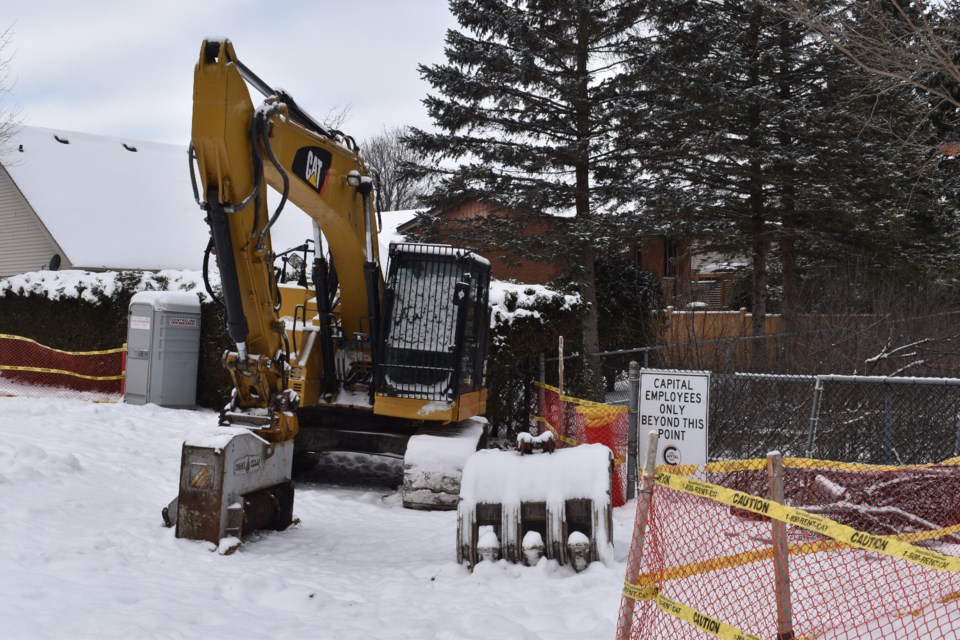Maintenance work at the stormwater management pond beside Woodland Glen Park has some neighbours concerned the wildlife in the area will be impacted by the loss of the natural habitat.
The City of Guelph is planning to remove sediment and some plants from the pond, including a few trees.
The City of Guelph said in the maintenance notice “because plants play an important role in stormwater management, self-seeded and invasive species plants that interfere with how the pond works will be removed.”
This includes the removal of Buckthorn, an aggressively invasive plant that spreads rapidly and unimpeded while choking out native flora in the area.
Guelph resident Ashleigh Cass, who lives near Woodland Glen Park in the city's south end, said those living near the pond received a letter from the city of Guelph over the holidays with vague language about maintenance being planned on the stormwater pond.
“They did agree to save more trees than they planned, which is great,” said Cass. “They were out tagging this morning. We will see how much they really save. We remain very concerned about the herbicide use as well. We all understand that maintenance needs to be done. However, saving money should not trump the integrity and inherent value of the environment.”
The city hired an aquatic biologist to identify and collect wildlife living in the pond so it can be re-homed in a suitable habitat within the city before maintenance work begins.
Those living in proximity to Woodland Glen Park held a meeting on Monday with representatives from the City of Guelph to express their concerns with the removal of the flora and the potential impact it will have on the fauna within the area.
Cass raised her concern on the planned spraying of herbicide in the area, citing the children's play structure adjacent to the stormwater management pond and the baseball diamond that sits a few hundred metres away from the area as areas of concern to her.
“I think it goes without saying that spraying any pesticide or herbicide next to a pond, kids playground, and a ball diamond, is cause for concern,” said Cass. “Not to mention the fact that preventing future growth of all vegetation, not just invasive species, means a lost habitat for many animals.
"The city’s plan is to save as many trees as possible on the site," said Prasoon Adhikari, supervisor of environmental engineering, engineering and transportation services and development and environmental engineering with the city of Guelph.
"We only need to remove vegetation that will prevent safe site access to complete required stormwater management pond maintenance activities. Removing overgrown vegetations, including non-native trees and invasive plant species, such as buckthorn, is required to maintain safe access to the pond; maintain flow in and out of the pond to avoid excessive sediment deposits, which helps prevent local flooding, and improve overall ecological health of the pond."
Adhikari added: "Manual removal of vegetation is not always effective. We sometimes use herbicides to minimize disruption to surrounding plants and wildlife and prevent invasive plants from growing back. This means, in some areas near the pond, we will need to apply herbicides. This will be conducted by a certified applicator."
The city plans to apply Garlon RTU to control the buckthorn as per the city's Invasive Plants Management Plan in accordance with Ontario Pesticides Act.
The herbicide will be applied to the soil around the plants where it will be absorbed by the root as opposed to spraying it throughout the whole site, to avoid runoff. This product is registered for use in Canada and has been tested to ensure minimal risks to human health and the environment.
"We understand that these ponds do naturalize over time and provide habitat for fish and wildlife, which are taken into consideration during the maintenance activities. To maintain the ecological health of the pond removal of invasive plant species is a necessary step. As such, we have arborists on-site to monitor the work," said Adhikari.
